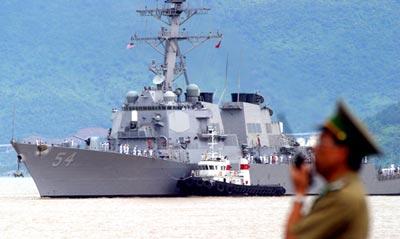

 |
| USS Curtis Wilbur (File photo) |
On Jan. 30, several U.S. media reported news regarding the USS Curtis Wilbur, a guided missile destroyer, entering the waters of China’s Xisha Islands without prior notification. Relevant departments including the Chinese Foreign Ministry and Defense Ministry responded immediately. It is the second time that a U.S. warship has intruded into the South China Sea after the USS Lassen illegally entering waters near islands and reefs of China’s Nansha Islands on Oct. 27, 2015.
Compared to the last time, this operation is more calculated.
Firstly, the U.S. has paved the way for the incursion through widespread propaganda. For months, the U.S. media have been hyping up the South China Sea issue. During his recent visit to Asia, the U.S. Secretary of State instigated ASEAN countries to unite against China on the issue.
Commander of the United States Pacific Command (USPACOM) stated in his speech that the so-called U.S. freedom of navigation operations (FONOPs) in the South China Sea will increase not only in number but also in scope and complexity.
Secondly, the location of the operation is “well-chosen". The U.S.is fully aware that on May 15, 1996, the Chinese government published a statement on its territorial sea baseline under the Law of the People's Republic of China on the Territorial Sea and the Contiguous Zone, which determined the baseline of territorial waters adjacent to the Chinese mainland and the baseline of waters adjacent to the Xisha Islands. Incursion into the Xisha Islands is obviously intentional.
Thirdly, the U.S. deliberately timed its action for expanded influence. Officials of the U.S. Department of Defense justified their actions to the press as safeguarding so called navigation rights and freedoms.
Such diligent calculations are no more than provocations to China in order to interfere with China’s legitimate activities in the South China Sea and force China to halt construction on the islands.
In contrast to the aggressive manner of the U.S., China’s reaction showed restraint. The troops that are guarding the islands and navy vessels responded immediately and appropriately with surveillance and vocal warning, nothing further.
Chinese authorities stated the country’s solemn stance on the U.S. warship’s incursion and lodged warnings while urging the U.S. side to respect and abide by China’s relevant laws. China hopes that the U.S. will make greater efforts to increase mutual trust and safeguard regional peace and stability.
China had its reasons for adopting a low-profile reaction, because China is perfectly clear that Uncle Sam’s most recent military action is most likely a bluff. The U.S. military only stated that the vessel “entered” relevant waters without providing further details, leaving room for the audience to imagine the “magnificence” of the U.S. military, which in fact was a hasty passing through.
Pentagon officials avoid describing the confrontation between Chinese and U.S.militaries, stressing the action is merely an “innocent passage”. They also lied about not encountering Chinese navy vessels to reduce the acuteness of the conflict.
Also, the U.S. will not challenge China on key issues. After showing its military powers, the U.S. reiterated that it won’t take any stand on territorial disputes concerning the South China Sea. This indicates the U.S. is unwilling to go head-on-head with China to spin the situation out of control.
China never flinches from provocations. As proved many times before, provocations from the U.S. will never force China to give up its territorial interests over the South China Sea.
China will continue its legitimate activities and is fully prepared for any provocations regarding the region and is fully capable of defending itself.
So who is the U.S. trying to intimidate? Clearly it does not work on China. However, it could cause worries for neighboring countries around the South China Sea.
China has always given priority to regional peace and stability with the utmost sincerity and has advised the U.S. not to draw fire back on itself. As a responsible major country, China will never stir up regional tensions. It is the U.S. who has been repeatedly sending vessels against China’s protestations thus leading to such encounters between both sea and air forces. The U.S. should take both personnel securities into consideration and avoid accidents given its military “professionalism”.
The U.S. should bear in mind that China has never been afraid of “paper tigers". Courtesy calls for reciprocity. The U.S. should be a friend, not rival of China.
This article is edited and translated from “纸老虎”示威吓唬谁 Source: People's Daily Overseas Edition.
The author is the Deputy Director of the Department for International and Strategic Studies at the China Institute of International Studies.
 Have you ever taken these beautiful subways in China?
Have you ever taken these beautiful subways in China? Chinese beauties, foreign models meet in Chengdu
Chinese beauties, foreign models meet in Chengdu Awesome! Aerial pictures taken on J-11 fighter
Awesome! Aerial pictures taken on J-11 fighter A foreign girl explains what China should be proud of
A foreign girl explains what China should be proud of Chinese navy's air-cushioned landing craft in pictures
Chinese navy's air-cushioned landing craft in pictures Chinese pole dancing master opens class in Tianjin
Chinese pole dancing master opens class in Tianjin Splendid Sichuan after snow
Splendid Sichuan after snow College girl of Vancouver crowned Miss Chinese Int'l 2016
College girl of Vancouver crowned Miss Chinese Int'l 2016 Pentagonal Mart becomes the largest vacant building in Shanghai
Pentagonal Mart becomes the largest vacant building in Shanghai Top 20 hottest women in the world in 2014
Top 20 hottest women in the world in 2014 Top 10 hardest languages to learn
Top 10 hardest languages to learn 10 Chinese female stars with most beautiful faces
10 Chinese female stars with most beautiful faces China’s Top 10 Unique Bridges, Highways and Roads
China’s Top 10 Unique Bridges, Highways and Roads Unfair to blame Hollywood racism on China
Unfair to blame Hollywood racism on China 95% of projects on financing platform found to be fake probe
95% of projects on financing platform found to be fake probe 'Strictest’ asset reporting system still leaves out too much experts
'Strictest’ asset reporting system still leaves out too much experts The loss of ‘The Voice’ proves Chinese TV needs to stand on its own two feet
The loss of ‘The Voice’ proves Chinese TV needs to stand on its own two feetDay|Week